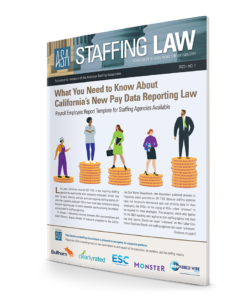Originally published in Staffing Success Magazine (Nov-Dec 2005)
By Mark Hersberger
David Bartholomew has no free time. Being chief executive officer of Staffmark, a Little Rock, AR, firm with more than 250 offices in 28 states, consumes the nine-to-five—and then some. As 2006 chairman of the ASA board of directors, Bartholomew will crisscross the nation addressing affiliated chapters. What’s more, he has four kids between the ages of 14 and 20 that he and his wife Caroline chase across the state to attend their varied activities.
Whew!
Still, the affable Bartholomew, who lives and works in Nashville, TN, takes it in stride, enthusiastically noting that “it’s every parent’s dream” to see children grow up so successfully. Son Will, 20, plays football at Rhodes College in Memphis; daughters Mary Katherine, 18, and Clair, 14, are involved in soccer and other sports; and Ellie, 16, attends a private boarding school.
The athletically inclined children are simply following in the footsteps of their father, who was a very accomplished soccer player at Rhodes and has won multiple championships at his tennis club. As older brother Sam notes, “David is unique in that he was probably a better athlete at 30 than he was at 20. In fact, he’s better at 40 than he was at 20!”
“He’s an exceptional parent,” comments Jim Caden, a close friend who worked with Bartholomew in real estate during most of the 1980s. “I couldn’t say enough about what he does with and for his family.”
“Multitasker” may not do justice to the breadth of Bartholomew’s commitments. When it comes to his involvement with ASA, though, he understands clearly that the effort invested more than pays for itself.
A Stand for Staffing
Bartholomew doesn’t consider the staffing firm down the street to be Staffmark’s true competition. “It’s other things that can destroy the industry,” he explains. Those other things include legislation or judicial rulings harmful to the industry, and sometimes staffing companies’ own behavior. “We need to be progressive in setting standards, or the government or someone else is going to come in and do it,” he says.
Being progressive means “getting out in front of issues that slow us down.” I-9 compliance, assignment limits, indemnification agreements—Bartholomew wants to see the industry come together and work out some of these problems on its own.
Besides being proactive on the legislative front, Bartholomew has another aggressive goal for his tenure: Raise the bar on industry professionalism. “We’ve got to make customers aware that we have a code of ethics that ASA members follow,” he says. Bartholomew equates staffing professionals with bankers and accountants because of the great service they provide, and wants to convey this message to staffing customers.
Customer perception, in fact, lies at the root of raising industry standards. “If customers see value in their staffing provider being an ASA member, then that drives staffing firms to be members,” explains Bartholomew. “Those nonmember firms will look at the ASA code of ethics and know what the association stands for.”
Exhibit A in Bartholomew’s vision: The ASA marketing campaign, conceived earlier this year to promote the industry’s top assets: flexibility and access to talent. He cites it as a good start in making ASA membership a more important factor in customers’ buying decisions. Research driving the campaign shows that customers say the association’s code of ethics is the most important reason to work with an ASA member.
After all, picking the right staffing firm benefits the customer tremendously. “We deal with a company’s No. 1 asset, its people, and its No. 1 expenditure, payroll,” Bartholomew says. However, an overemphasis on price has led to commoditization.
To counter commoditization, Bartholomew places great importance on staffing firms partnering with their customers. He recommends, “Pick customers that appreciate value. Cultivate these customers so they aren’t concerned about price because you are so important to them.”
How? “We need to take the attitude that we are the pros. People are a company’s biggest asset—that’s what we provide.”
Planting Roots and Growing Strong
How does Bartholomew like working in staffing? “I’m having a blast!” he says of his 12 years in the industry. He made the switch to staffing when real estate experienced a downturn in the early 1990s. Bartholomew became president of Cobble Personnel in Nashville and “just fell in love with the staffing business.”
He particularly likes the unique role staffing plays in the economy. “It’s a great source of jobs for the American work force,” he says. “Temporary and contract work arrangements are a great way to take care of demand and give organizations flexibility. We’re providing a huge service that allows U.S. businesses to be competitive—I’d hate to see what would happen if staffing disappeared.”
“He really enjoys staffing and his role in it,” notes Caden. “He’s passionate and energetic about it.” Caden cites Bartholomew’s transition to staffing as a turning point in his friend’s career, and now says, “I just stand back and admire the progress he’s made.”
In 1993, Bartholomew became co-owner of Human Resources Inc., which then joined with other companies to become Staffmark in 1996. The company has done very well since, which comes as no surprise to Caden. “I consider David to be the most talented and energetic businessperson I’ve met in any field,” he says. “He’s a bulldog when he sees something he wants.”
Of his brother’s success in staffing, Sam Bartholomew notes, “David is a people person, and he has good communication skills. He has the type of outgoing personality you need to do well in staffing.”
Sam, who worked as an aide to former Tennessee Sen. Howard Baker, also detects a certain political savvy in David—an important quality for someone expected to be the chief political advocate for the industry. “He understands politics, and has had exposure to it by working with local governments,” says Sam.
Furthermore, “David is a high-energy, get-it-done type of guy,” explains Sam. “He’s found his niche in staffing and is very qualified to lead the industry. He’ll fight for what’s best for the staffing industry. David is not a shrinking violet.”

